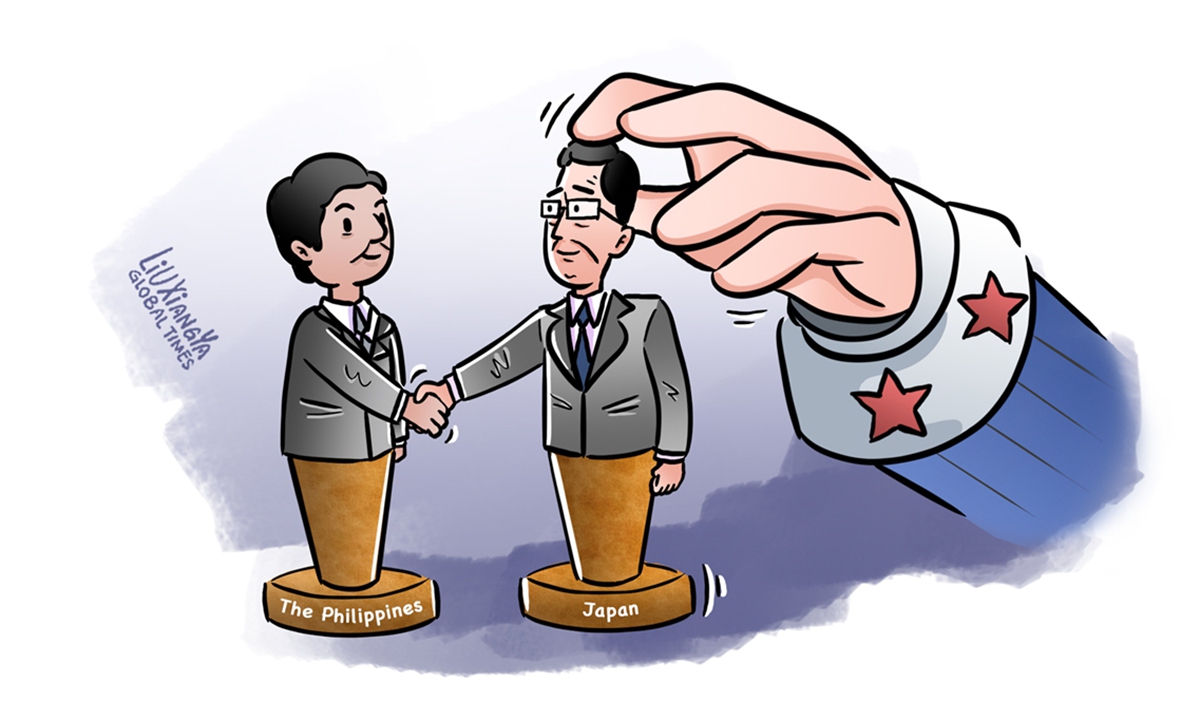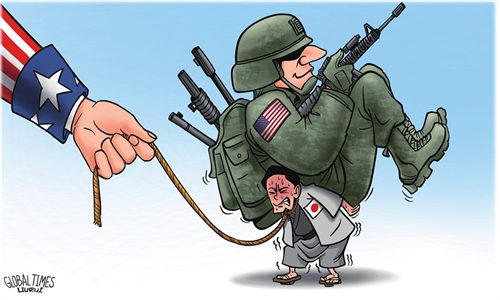US-Japan-Philippines’ minilateral mechanism harms the prosperity, stability of Asia-Pacific

Illustration: Liu Xiangya/GT
On April 11, US President Joe Biden, Japanese Prime Minister Kishida Fumio and Philippines President Ferdinand R. Marcos Jr will hold a trilateral summit in the US, the first trilateral US-Japan-Philippines leaders' summit. Focusing on various issues in security and the economy, the summit aims to establish a US-centric minilateral cooperation mechanism in the Asia-Pacific region. However, the negative impact on regional stability far outweighs any positive effects.
During the Cold War, the US established five sets of US-centric bilateral alliances in the Asia-Pacific region. Since the end of the Cold War, it has continuously attempted to promote the "multilateralization" of these bilateral alliances. In recent years, the US has actively sought to create minilateral mechanisms in the fields of security, economy, and technology in the Asia-Pacific region. For example, the Quad and AUKUS focus on security issues, the Indo-Pacific Economic Framework (IPEF) emphasizes economic and trade areas, and the Chip 4 alliance focuses on high-end chip technology.
It is worth noting that the various minilateral cooperation mechanisms promoted by the US share three common features: first, an emphasis on the so-called "shared values," namely Western values; second, an emphasis on the "rules-based order," which are rules dominated by the West; and third, a focus on China, involving political, economic and security affairs related to China and activities in China's surrounding areas. The upcoming US-Japan-Philippines summit represents a new form of minilateralism, which may be further institutionalized in the future. According to reports, the US, Japan and the Philippines plan to conduct joint patrols in the South China Sea for the first time this year, strengthening cooperation in maritime security. On April 7, the US, Australia, Japan and the Philippines conducted their first joint maritime exercise in the waters of the South China Sea.
The first-ever US-Japan-Philippines leaders' summit may cover multiple issues in security and economy, such as joint patrols in the South China Sea, military assistance from the US and Japan to the Philippines, security in the Taiwan Straits, semiconductor and supply chain cooperation, and climate change. Although the US, Japan and the Philippines emphasize peace, stability and prosperity in the Asia-Pacific region, their construction of a small group based on specific values and targeting China as the main adversary will inevitably worsen relations among relevant countries and undermine regional stability and peace.
In the security field, the US has long carried out the so-called freedom of navigation operations in the South China Sea, often entering the waters near China's South China Sea islands and reefs, provoking China's territorial sovereignty, worsening China-US relations, and posing a threat to China and regional security. The Philippines and the US conducted so-called joint patrols in the South China Sea, frequently trespassing on China's South China Sea islands and reefs. This has led to multiple standoffs between the Chinese and Philippine coast guards and even collisions between coast guard ships, seriously damaging China's territorial sovereignty and disrupting the security environment in the South China Sea. Japan has provoked China in the Diaoyu Islands area, interfered in the situation across the Taiwan Straits and intervened in the South China Sea issue, leading to a more complex situation in China-Japan relations and regional security.
In the economic and technological fields, the US and Japan are actively promoting the restructuring of regional industrial chains and supply chains to bypass China, focusing on industrial chains and supply chains dominated by semiconductors, artificial intelligence and key minerals. Such artificially driven industrial relocation or supply chain restructuring behavior goes against market principles and economic laws. It is not conducive to regional economic stability and global economic development, and can also lead to international relations within the region becoming more complicated.
The US, Japan and the Philippines seem to have a common motivation to build a "small group" in the economic and security fields, but various constraints prevent them from fully achieving their goals. First, the anti-globalization practices of the three countries do not align with the principles of free trade, and they are unable to resist the trend of economic globalization. Second, addressing global climate change, preventing nuclear proliferation and promoting world economic development require the participation of major countries such as China. Third, countries in the region do not support confrontation between major powers and are unwilling to take sides between China and the US.
Joint patrols in the South China Sea or collusion in political diplomacy and international public opinion by the US, Japan, and the Philippines could lead to a deterioration of regional security and potentially threaten China's surrounding security. The US hopes that Japan and the Philippines will act as "sheriff" in the Asia-Pacific alliance system. However, are Japan and the Philippines truly prepared to take the risk and face the possibility of future conflict with China?
The author is an associate research fellow with the National Institute of International Strategy at the Chinese Academy of Social Sciences. opinion@globaltimes.com.cn


